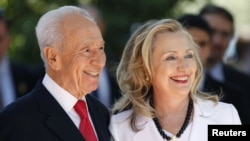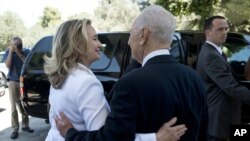JERUSALEM — U.S. Secretary of State Hillary Clinton is having talks with Israeli leaders on the conflict in Syria, the political transition in Egypt, and the perceived threat from Iran's nuclear program.
Secretary Clinton says she has come to Israel "at a moment of great change and transformation in the region."
"It is a time of uncertainty but also of opportunity," she said. "It is a chance to advance our shared goals of security, stability, peace, and democracy along with prosperity for the millions of people in this region who have yet to see a better future."
Senior State Department officials say Clinton wants to hear from Israelis about the impact of this past year's uprisings across North Africa and how the two countries can continue to work together on Middle East peace, Syria, and Iran.
"It is in moments like these that friends like us have to think together, act together. We are called to be smart, creative, and courageous," she said.
Clinton's Jerusalem schedule included separate talks with Israeli Foreign Minister Avigdor Lieberman, Defense Minister Ehud Barak, Prime Minister Benjamin Netanyahu, and President Shimon Peres.
President Peres praised Secretary Clinton for helping to organize international efforts toward a political transition in Syria to end what he calls President Bashar al-Assad's attacks against his own people.
"It is beyond acceptable norms by humanity no matter if you are Christians, or Jews, or even Arabs," he said. "I appreciate the fact that the Arab League stood up against it clearly and loudly. It is unprecedented."
U.S. State Department officials say international efforts to prevent Iran from developing nuclear weapons are at an "important moment," so Secretary Clinton wants to consult with Israeli leaders about the threat. Israel has not ruled out a military strike to prevent Tehran from making atomic weapons. President Peres says it is the "most dangerous issue of our time."
"There is a total understanding that we have to do whatever we can to prevent Iran from endangering the freedom and independence of other people or to endangering the life of other people," he said.
Secretary Clinton met here in Jerusalem with Palestinian Prime Minister Salam Fayyad after meeting last week in Paris with Palestinian President Mahmoud Abbas. Israel's President Peres thanked the Obama administration for continuing to pursue an Israeli-Palestinian peace accord.
"We should not give up hope," he said. "We shouldn't stop. We should be consistent. We should be determined. The Palestinians don't have a better alternative. We don't have a better alternative."
Secretary Clinton came to Israel from Egypt where she held separate talks with President Mohamed Morsi and military chief Mohamed Hussein Tantawi, encouraging both to seek consensus in Egypt's post-revolutionary political transition.
President Peres says Israelis are watching closely the formation of a new government in Cairo.
"For us Israelis, for the United States, Egypt is a key country in the Middle East. And much depends upon Egypt and a little upon us as well to continue the great march of peace for the benefit of all people in the Middle East. And you are trying to suggest stabilization in a destabilized land," he said.
This is the last stop on a 12-day trip for the U.S. secretary of state that, in addition to France, Israel and Egypt, has included stops in Afghanistan, Japan, Vietnam, Laos, and Cambodia.
Secretary Clinton says she has come to Israel "at a moment of great change and transformation in the region."
"It is a time of uncertainty but also of opportunity," she said. "It is a chance to advance our shared goals of security, stability, peace, and democracy along with prosperity for the millions of people in this region who have yet to see a better future."
Senior State Department officials say Clinton wants to hear from Israelis about the impact of this past year's uprisings across North Africa and how the two countries can continue to work together on Middle East peace, Syria, and Iran.
"It is in moments like these that friends like us have to think together, act together. We are called to be smart, creative, and courageous," she said.
Clinton's Jerusalem schedule included separate talks with Israeli Foreign Minister Avigdor Lieberman, Defense Minister Ehud Barak, Prime Minister Benjamin Netanyahu, and President Shimon Peres.
President Peres praised Secretary Clinton for helping to organize international efforts toward a political transition in Syria to end what he calls President Bashar al-Assad's attacks against his own people.
"It is beyond acceptable norms by humanity no matter if you are Christians, or Jews, or even Arabs," he said. "I appreciate the fact that the Arab League stood up against it clearly and loudly. It is unprecedented."
U.S. State Department officials say international efforts to prevent Iran from developing nuclear weapons are at an "important moment," so Secretary Clinton wants to consult with Israeli leaders about the threat. Israel has not ruled out a military strike to prevent Tehran from making atomic weapons. President Peres says it is the "most dangerous issue of our time."
"There is a total understanding that we have to do whatever we can to prevent Iran from endangering the freedom and independence of other people or to endangering the life of other people," he said.
Secretary Clinton met here in Jerusalem with Palestinian Prime Minister Salam Fayyad after meeting last week in Paris with Palestinian President Mahmoud Abbas. Israel's President Peres thanked the Obama administration for continuing to pursue an Israeli-Palestinian peace accord.
"We should not give up hope," he said. "We shouldn't stop. We should be consistent. We should be determined. The Palestinians don't have a better alternative. We don't have a better alternative."
Secretary Clinton came to Israel from Egypt where she held separate talks with President Mohamed Morsi and military chief Mohamed Hussein Tantawi, encouraging both to seek consensus in Egypt's post-revolutionary political transition.
President Peres says Israelis are watching closely the formation of a new government in Cairo.
"For us Israelis, for the United States, Egypt is a key country in the Middle East. And much depends upon Egypt and a little upon us as well to continue the great march of peace for the benefit of all people in the Middle East. And you are trying to suggest stabilization in a destabilized land," he said.
This is the last stop on a 12-day trip for the U.S. secretary of state that, in addition to France, Israel and Egypt, has included stops in Afghanistan, Japan, Vietnam, Laos, and Cambodia.





